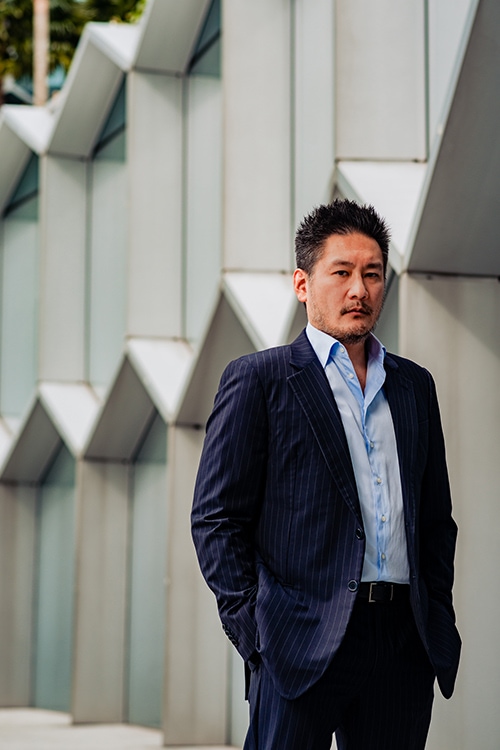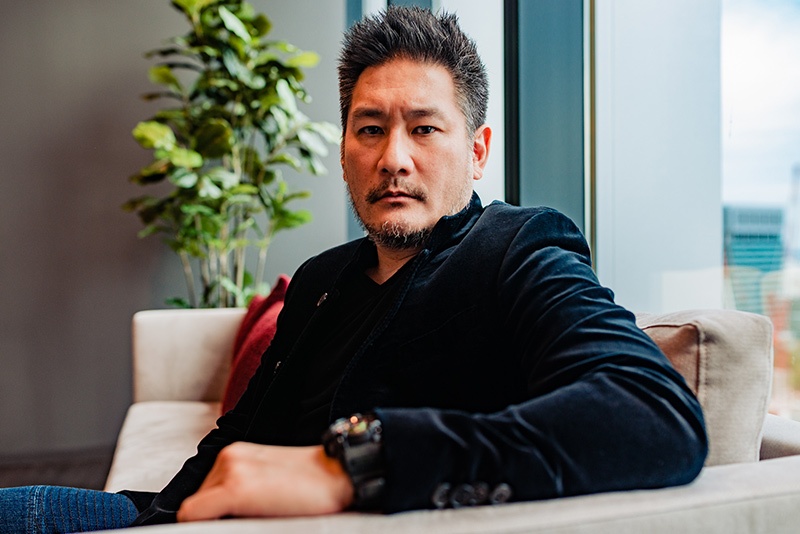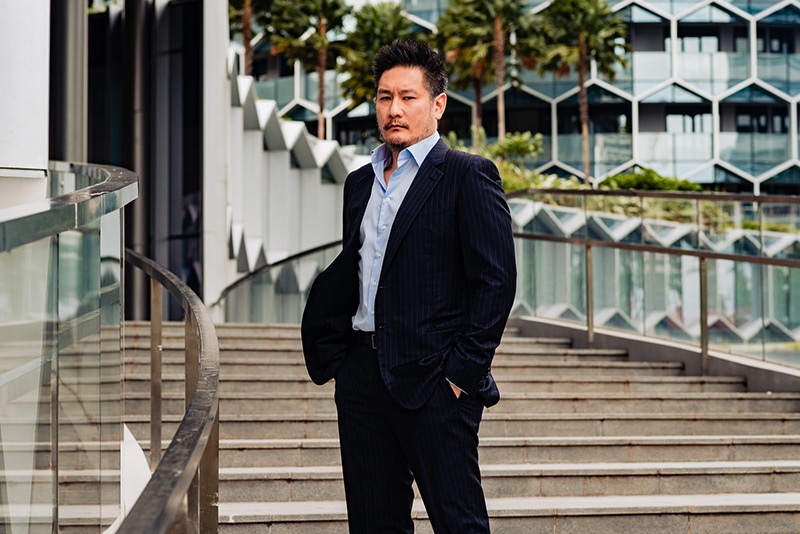ONE Championship as a global sports media property has come a long way in 9 years. Despite having a valuation of around US$1 billion and broadcasting to over 2.7 billion potential viewers across all its platforms, founder and CEO Chatri Sityodtong still feels passionately that he is on a moral mission to instil the traditional values of martial arts such as integrity, honour, respect and compassion. His athletes, whom he calls ‘superheroes’ espouse and embody them too. Ensconced comfortably in an armchair, with a ONE Championship belt draped across the coffee table, Chatri reminisces about the tough times and his mother’s advice—which he believes has got him through the highs and lows of building an empire from scratch to what it is today. The words “Chatri, you are going to grow up to be somebody special and help so many people” have been a source of strength whenever brands or athletes did not want to be associated with the then-fledgeling start-up. Still, his vision of martial arts as a form of character building never wavered, and in spite of the violent misconceptions that people have about MMA, the company found its footing in a fan base consisting mostly of millennials in Asia Pacific (where mobile penetration is projected to increase from 48 per cent in 2018 to 65 per cent in 2025). Although ONE Championship has yet to show profitability, Chatri believes that it is only a matter of time before the company turns a profit. “We are a billion-dollar property, but it is only the beginning,” he says emphatically. Here, he talks about his struggles in life, the company’s trajectory and the untapped potential in sports media in Asia—drawing comparisons between ONE Championship and the NFL.
Already a Unicorn, ONE Championship’s Chatri Sityodtong Shares His Strategy for Hypergrowth
KINGSLEY LIM: Everyone is familiar with your rags-to-riches story. How has your childhood shaped the person you are today?
CHATRI SITYODTONG: During my childhood days, I grew up in a middle-class family in Thailand. It is kind of sad to say but I feel like my life only began when my father went bankrupt and abandoned the family. Before that, I was never put in a situation where I was truly tested as a human being. People think it is kind of screwed up, but I am most grateful for my days in poverty: I discovered so much about myself, the meaning and purpose of life and how much of a fighter I was. A lot of my charity work is around underprivileged children because I know what it feels like to be poor.
KINGSLEY: Your mother has been a central figure in your life. Are there any important values that she has imparted to you?
CHATRI: There are many. My mother is very philosophical; she’s a deep thinker about life, what it means to be a good person and to live a good life. The number one thing she taught me was integrity and has never done anything against her values and morals. In my second year at Harvard, she came to live with me in my tiny dorm room. When I graduated, I had several job offers but chose the start-up life even though I had no money with a classmate. We went to Silicon Valley and I couldn’t even afford a bed. Our apartment doubled as the office. During the day, eight employees would come in to work and at night, my mum and I slept in sleeping bags on the floor, while surviving on US$1.50 microwaved meals. The original plan was for me to go to Harvard and get a stable job. I remember my mum saying to me: “Chatri how can you do this? You will end up bankrupt like your father.” But when she saw my conviction that this was what I wanted to do with my life, she supported me. That’s a mother's unconditional love.
KINGSLEY: Are you still in contact with your father?
CHATRI: My father passed away two and a half years ago. I reconciled with him five or six years ago. I reached out to my aunts and uncles who found him living in Pattaya, Thailand. When I met him, it was very emotional. The saddest part was you can’t repair those lost decades. After meeting him, I thought we had time and somehow things would get better. But he had a stroke shortly after and passed away.

"I genuinely thought that if I earned a lot of money, all my problems would go away."
KINGSLEY: Do you think your motivations in life have changed as you have gotten older?
CHATRI: I was a poor student with lousy grades. I was also suspended for fighting and got into detention. I went to the principal’s office all the time. I remember having a conversation with my father at the dining table and he asked me what I wanted to do with my life, to which I replied, ‘Maybe I want to be a doctor or something.’ And he said something to the equivalent of “you will never amount to anything in life.” Since then, we never spoke about it again and he went bankrupt and we became poor. I genuinely thought that if I earned a lot of money, all my problems would go away. At 35, I started my hedge fund and it did well but I wasn’t happy. I remember feeling so empty as a multimillionaire. I could buy more houses, more cars, more material things, but all I would be doing was to fill a void in my heart. I didn’t understand what I was supposed to do, but I knew that my purpose was not to make money. There was something deeper in life that I had to find and I will tell you a life-affirming story that made me realise I was on the right path.
In 2016, we held our first event in Bangkok and I had been away for many years. Thankfully, the Thai media welcomed me back with open arms and painted me as a hero of sorts for creating ONE Championship. I was blown away by the love and reception. On fight night, the stadium was full and I remember soaking it all in. I opened my eyes and a lady was running towards me with her two daughters. She approached me and said, “Sir Chatri, we saw your documentary on TV, and my daughters and I wanted to talk to you. We don’t know much about martial arts, but I’m a single mother and I want my two daughters to meet you and know that if they work hard they can make something out of their life.” She had tears in her eyes and I got teary as well.
People think that ONE Championship is about fighting, but it is not. It is literally about unleashing real-life superheroes who ignite the world with hope, strength, dreams, and inspiration. I realised that as a sports property, we can shape culture, society, values, and how little boys treat little girls. In my ten years on Wall Street, I never felt this level of deep emotional sense of purpose and fulfilment—that my life was worth living.
KINGSLEY: Your last professional Muay Thai fight was in 2008 in Thailand. Have you ever wanted to return to the ring?
CHATRI: In 2008, I wanted to come back and compete again. I was 37 and I think that was my mid-life crisis. In the transition of retiring as a hedge fund manager, I wanted to relive my childhood.
KINGSLEY: Was the retirement sparked by the Great Financial Crisis?
CHATRI: Yes, I retired a year later in 2009. In 2007, I already knew inside my heart, but it took me about a year and a half to pull the trigger. If I wasn’t introspective and had the courage to chase after my calling, I would still be a hedge fund manager today.

KINGSLEY: It’s been nine years since you founded ONE Championship and Evolve MMA. Throughout this journey, what were some of the watershed moments for you, including the lowlights and highlights?
CHATRI: During the first few years of ONE Championship, I faced thousands of rejections and failures every single day. This happened for three years straight. No broadcaster wanted to show our content, fans did not want to watch our show, athletes did not want to be part of the company and brands were not keen to invest. Governments also did not want us in their countries.
KINGSLEY: Despite UFC being a success in the US?
CHATRI: Yeah, especially because of that. People used to say that UFC was going to crush us. I remember calling my mum at the end of the third year and telling her, 'This is so much harder than I thought; I’m thinking about quitting.' And my mum’s reply was “see I told you so. You should have listened to me. Why don’t you just quit?” But something in my soul told me that this was what I was meant to do. I persevered and from 2015, our viewership numbers went all the way up from 200,000–300,000 views online to 7 billion views in five years.
KINGSLEY: Do you think because of how violent MMA is, the nature of the sport impedes you from getting more advertisers?
CHATRI: There is a big misconception about martial arts because UFC portrays martial arts like a bloodsport: violent, full of anger, hatred and controversy. That’s how they sell the fights. A lot of their “heroes” are not role models. They are people who have gone to jail, who insult other people’s religion, cocaine abusers, wife beaters, etc. ONE Championship is different. It is rooted in the values of martial arts such as integrity, humility, honour, respect, courage and compassion. This is why none of our heroes has ever been in a scandal on the front page of a newspaper other than for charity work or winning titles.
KINGSLEY: ONE Championship has had losses of S$20.3 million, S$34.3 million and S$82 million in 2016, 2017, and 2018 respectively. How do you plan on making ONE Championship a profitable venture?
CHATRI: I don’t care if ONE Championship loses another US$1 billion. My ultimate vision for the company is to create a US$100 billion sports property. The NFL is the world’s most valuable sports property today. It is worth approximately US$91 billion. If you think about American football and the NFL, it is a single country sport. The NFL serves 325 million people. No one else plays American football and no one else appreciates it. If you look at ONE Championship’s market opportunity and how big it is, there are 4 billion people in Asia and 3 billion viewers in the same time zone.
KINGSLEY: Your company has received US$70 million in additional funding, bringing the total funding to date of US$346 million. Supposing that 2020’s losses would be wider than the S$82 million loss incurred in 2018, is US$70 million enough to sustain the company?

CHATRI: Based on our current trajectory (even with Covid-19), I predict that ONE Championship will be profitable within 12 months and we are on track. Our costs have been coming down and our revenues are rising, so we anticipate profitability soon. That doesn’t mean that we will not continue to invest. We can easily raise another billion dollars to continue to invest all over the world as we grow our property.
KINGSLEY: While ONE Championship is a sports media company, it has been reported that the company had $19.7 million in broadcast revenue, S$16.7 million in sponsorship income, and slightly under S$1 million in ticketing revenue (2018). Most would have expected ticketing revenue to be a large percentage of overall sales. Are there plans to rectify this?
CHATRI: It is how you classify sales. When a sponsor sponsors an event, they will take a big block of tickets. So ticketing and sponsorship income are combined. For example, Globe, who is a big sponsor for us in the Philippines, will take the whole stadium. The most important thing about sports media property is not ticket sales. If you look at the NBA or NFL, ticket sales are low single-digit percentages. The biggest is media rights—broadcast revenue. As long as viewership numbers continue to climb and hit record highs, the broadcast media companies like Mediacorp, Amazon, YouTube or Netflix will pay for our content. The NFL has US$13 billion in revenues and more than half of that (US$7 billion) comes from broadcast revenue.
"If we do a good job of growing our metrics and continue to market and unleash real-life superheroes, there should be no reason why we can’t command the same level of attention like an India-Pakistan World Cup match."
KINGSLEY: Has viewership numbers increased for live, closed-door events, especially during Covid-19?
CHATRI: Yeah. Although we weren’t able to hold events for March, April and May, our organic video views on our digital social platforms reached record highs. For our most recent event in Thailand, it was a very strong start and we were very encouraged by what we saw. We did a show in June in China and resumed events in July, August, and September in Thailand. At the moment, we are working with the governments around the region to open up borders specifically for ONE Championship shows.
To people who are not experts in sports, they think that the event itself is what matters. Actually, what really matters is TV ratings and viewership numbers. And our shows do get an average of 29 million viewers per event. If we do a good job of growing our metrics and continue to market and unleash real-life superheroes, there should be no reason why we can’t command the same level of attention like an India-Pakistan World Cup match. This is the power of sports that people don’t understand. Sports can make a whole country stop. I’m a crazy risk-taker and a crazy dreamer, but I will shut up all the haters, naysayers, and doubters for sure.
KINGSLEY: What do you think is your most marked characteristic as a leader?
CHATRI: My mum appeared in the media recently and they asked her to describe me in three words. She said, “Extreme, philosophical and compassionate.” I think that best describes me as a leader as well. My team would probably say that I’m the fiercest leader they have ever worked with, but at the same time, generous and compassionate.
KINGSLEY: Are there any leadership skills that you lack or are working on improving at the moment?
CHATRI: I view myself as a work in progress. I believe in learning every day. In my martial arts training, it is a never-ending journey too. I tell my team every day that they should be one per cent better at their job (like being a better team player) and in all aspects of life—be it as a brother, sister, mother, daughter, or friend. I strive to be better all the time and have grown as a leader in areas that are necessary for the business to succeed. The biggest negative thing about me is my temper and I’ve been working on it. I used to blow up every other week in the early days of ONE Championship. But in the last two years, I have only done it two to three times.
KINGSLEY: What’s the most difficult decision you have had to make as a leader, and how did you come to that decision?
CHATRI: I think firing people is always difficult. Throughout my career as a leader, I have had to make tough decisions—leadership is not about popularity, money, power, or success. It is about doing the right thing. I had to fire people for unethical behaviour, racism, prejudice, poor performance—all sorts of crazy things. It is never pleasant to fire people but it is part of a leader’s job.
****
Edited by Wy-Lene Yap

